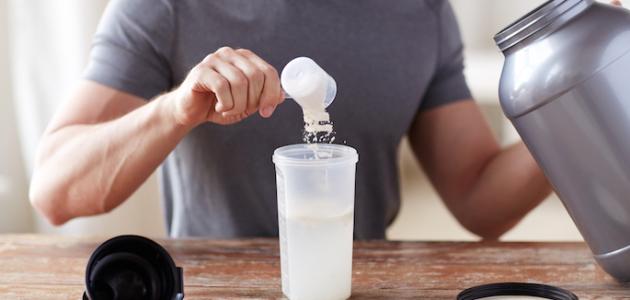Harmful effects of protein supplements for bodybuilding
Below is a detailed statement of the harms of nutritional supplements for bodybuilding:
Protein powders may contain unsafe ingredients
The US Food and Drug Administration considers protein powder a type of nutritional supplement, and it leaves it up to the manufacturer to evaluate the safety of nutritional supplements and place labels on them, so there is no way to know whether protein powder contains what the manufacturer claims. To learn more about that, you can Read the paragraph “Are there unsafe types of protein supplements” below.
There is a lack of information about the long-term effects of protein supplements
There is currently very limited data available on the potential side effects of taking large amounts of protein in supplement form.
Possibility of causing digestive problems
People with lactose intolerance, an allergy to dairy products, or difficulty digesting lactose (milk sugar) may experience gastrointestinal discomfort if they use milk protein powder.
It may contain a high percentage of sugars and calories
Some protein powders may contain a small amount of added sugar, and some types may contain a very high amount of sugar, which may reach 23 grams per scoop, so consuming them can increase the risk of blood sugar levels rising above the normal range, and the Association has shown The American Heart Association's maximum daily intake of added sugar is as follows: 25 grams for women and 36 grams for men.
Read also:Ways to develop muscle strength
Harmful effects of excessive protein intake for bodybuilding
Eating large amounts of protein in the form of protein powders, or even from food alone, can cause many harms, including the following:
Gaining fat
Adding protein in the form of powder to the diet leads to adding calories to the total daily consumption, and if the excess calories are not burned by practicing a sufficient amount of physical activity, or lifting weights enough to build more muscles, it is possible that the calories will turn into Excess into fat.
The reason for this is due to the body's inability to store excess protein in its original form in the body, thus converting it into fat, which is something that a person may not want when adding protein powder to the diet.
Increased risk of bone weakness
Consuming large amounts of protein leads to the generation of a large amount of acids in the body due to the increase in sulfates and phosphates that enter the body. The body tries to restore acid balance through the kidneys secreting more acids, and the skeletal system secreting calcium, which acts as an acidity neutralizer. Then calcium is excreted in the body. Urine outside the body, and this results in the loss of calcium from the bones, which may increase the risk of osteoporosis in the long term, especially in groups at risk of osteoporosis, such as women.
Read also:What are the benefits of abdominal muscles?
Causing harm to people with kidney problems
High-protein diets can cause increased pressure on the kidneys due to the formation of excess wastes called ketones, which are compounds that are usually generated when following a high-protein diet and there is a need to get rid of the products used in this diet.
For people with kidney failure, this stress can lead to a deterioration in their health. It may also lead to a decline in kidney function in people with healthy kidneys if they follow this diet for a long period of time.
Drought
Eating large amounts of protein may increase the risk of developing a condition called hyperketosis, especially when you do not eat a sufficient amount of carbohydrates. This is a condition in which toxic ketones accumulate in the body, and then the kidneys try to get rid of these substances, and many are lost. of fluids during this process, such as: urine, which increases the risk of dehydration, especially when more fluids are lost through sweating during exercise.
Not only does dehydration put pressure on the kidneys, it can affect heart function in severe cases. Other side effects of dehydration can include dizziness, lethargy, and bad breath.
Read also:Treating weak body muscles
An overview of protein supplements and their types
Many gym-goers and weightlifters talk about the protein shake that is usually drunk after exercise. The popularity of protein powder has increased as a nutritional supplement, which is consumed in several ways, including: a drink or a protein shake.
Types of protein supplements and their ingredients
The types of proteins used for bodybuilding vary, and in fact there is a plant protein available for bodybuilding, such as: soybeans, peas, rice, and potatoes, and it is also available from animal protein sources, such as: eggs, milk casein protein, and whey protein.
Protein powder may contain other ingredients, such as: added sugars, artificial flavors, thickeners, vitamins, and minerals. The amount of protein can vary from one type to another, and the rate of protein in one scoop ranges from 10-30 grams. Protein supplements used to build muscles contain a percentage of High in protein, while protein supplements used for weight loss contain a lower percentage of protein.
Are there unsafe types of protein supplements?
Before consuming a specific protein supplement; It is necessary to ensure its quality, as some types of proteins may be high in heavy metals and toxins. Researchers indicated in a report conducted by the Clean Label Project in 2018 about toxins in protein powders after examining 134 products; Many protein powders contain heavy metals, such as: lead, arsenic, cadmium, and mercury, in addition to Bisphenol-A, which is a chemical compound used in the manufacture of plastics. Some types of supplements also contain pesticides and pollutants. Others are linked to an increased risk of cancer and other health conditions.
Some toxins were found in high quantities. For example, a certain protein powder contained 25 times the permissible limit of bisphenol A. The report showed that the pollutants come from manufacturing processes, or as a result of plants absorbing toxins present in the soil, which are transformed into protein powders. Not all protein powders tested contain high levels of toxins.
In addition, the report showed that products containing eggs as a protein source were safer than others, while products that relied on plants as a protein source were the least safe.
Tips for choosing the right protein supplements
If a person's goal in consuming protein supplements is to build muscle, it is recommended to choose a protein powder with a high biological value, which is the value that measures the body's ability to absorb and use protein. Whey protein is one of the best options, and there are a set of precautions that must be taken into consideration. Consideration before purchasing a specific protein supplement to ensure its quality, which are as follows:
- Ask questions about protein supplements and get comprehensive answers.
- Ensure that the product has been screened for heavy metals, antibiotics, and other environmental and industrial contaminants.
Is there a need to use protein supplements?
To answer your question, does a bodybuilder need protein daily? It should be noted that many people prefer to use bodybuilding protein for bulking up, and a normal person needs to consume 0.8 grams of protein per kilogram of his weight. For example; A person weighing 70 grams needs to consume 56 grams of protein daily, and it is worth noting that taking larger quantities than that is considered safe, as it is possible to consume an amount of protein that covers 15-25% of daily calories without causing harm.
It should be noted that athletes may be advised to eat larger amounts of protein compared to others. Many sports nutrition experts support that athletes consume a maximum of 2.0 grams of protein per kilogram of body weight per day. Smaller quantities may be sufficient for moderate or low-intensity exercises, but it is recommended that the percentage of calorie consumption from protein not exceed 35%.
Protein powders can be useful in very specific circumstances, as they are an easy, quick, and convenient source of complete, high-quality protein, but most people, even athletes, can obtain their full protein needs by eating low-fat protein sources, such as: meat. , fish, chicken, and dairy products.
It is worth noting that the body’s protein needs depend on the duration and intensity of physical activity, and the body’s daily protein requirements can be met by drinking a protein shake or eating food sources of protein. However, protein powder does not provide the nutritional value found in natural protein sources, as Protein shakes generally contain fewer nutrients than whole foods. For this reason, protein shakes may help you lose weight or build muscle, but whole foods can provide higher nutritional value and greater benefit to the body.
Benefits of protein for muscles and bodybuilding
Protein is an important part of a healthy diet, and a key to building and maintaining all types of body tissues, including muscles, as protein contains amino acids, which are the basic building blocks for muscle building and growth.
Bodybuilders and weightlifters need to eat dietary protein on a regular basis to build and maintain large muscle mass, but as we mentioned previously; It is important to use protein in moderate and recommended quantities without overdoing it to obtain its benefits What are the benefits of protein for bodybuilding? Come:
muscle growth
As mentioned previously, protein is an essential element for muscle growth, and many athletes consume protein drinks because they believe that these drinks help them build muscle after performing strength exercises.
A systematic review of 49 studies published in the British Journal of Sports Medicine in 2018 indicated that protein supplements significantly improve muscle size and strength in healthy adults who practice resistance exercises, such as weight lifting. Protein supplements were beneficial for men and women on both counts. Both, however, their effect may decrease with age, as older people need higher amounts of protein compared to younger people. It was noted in this review that once exceeding 1.6 grams of protein per kilogram of body weight, the body did not obtain additional benefits in Muscle growth.
Helping muscle recovery after exercise
In addition to contributing to muscle growth, protein consumption can help damaged muscles and tissues recover after exercise. As a result, athletes may use protein powder to relieve muscle pain after exercise faster.
A review of a group of studies published in the Journal of Exercise Rehabilitation in 2017 indicated that taking protein supplements after exercise can help recovery by reducing muscle damage, improving muscle performance, and producing muscle protein. Taking a whey protein supplement after exercise for a period of time has helped 7 days to increase fibroblast proliferation, restore muscle strength faster after exercise,
To encourage maximum protein production and muscle growth, the diet must contain a sufficient amount of complex carbohydrates that can be burned to fuel the muscles, leaving the protein to build new tissue rather than using it as an energy source.









